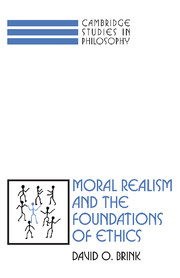Book contents
- Frontmatter
- Contents
- Preface
- 1 INTRODUCTION
- 2 MORAL REALISM AND MORAL INQUIRY
- 3 EXTERNALIST MORAL REALISM
- 4 DOES MORAL REALISM MATTER?
- 5 A COHERENTIST MORAL EPISTEMOLOGY
- 6 MORAL REALISM AND THE IS/OUGHT THESIS
- 7 A POSTERIORI OBJECTIONS TO MORAL REALISM
- 8 OBJECTIVE UTILITARIANISM
- Appendix 1 Must an infinite regress of justification be vicious?
- Appendix 2 Coherence, internalism, and externalism in epistemology
- Appendix 3 The is/ought thesis and intuitionism
- Appendix 4 Rawlsian constructivism
- Bibliography
- Index
4 - DOES MORAL REALISM MATTER?
Published online by Cambridge University Press: 11 January 2010
- Frontmatter
- Contents
- Preface
- 1 INTRODUCTION
- 2 MORAL REALISM AND MORAL INQUIRY
- 3 EXTERNALIST MORAL REALISM
- 4 DOES MORAL REALISM MATTER?
- 5 A COHERENTIST MORAL EPISTEMOLOGY
- 6 MORAL REALISM AND THE IS/OUGHT THESIS
- 7 A POSTERIORI OBJECTIONS TO MORAL REALISM
- 8 OBJECTIVE UTILITARIANISM
- Appendix 1 Must an infinite regress of justification be vicious?
- Appendix 2 Coherence, internalism, and externalism in epistemology
- Appendix 3 The is/ought thesis and intuitionism
- Appendix 4 Rawlsian constructivism
- Bibliography
- Index
Summary
So far, I have argued that reflection on commonsense morality supports moral realism. Reflection on moral inquiry supports a realist form of cognitivism. And this case for moral realism is strengthened, not defeated, by appeal to the practical or action-guiding character of moral considerations.
The moral antirealist might concede these points about the realist presuppositions of our normative practices but deny their significance. Rejection of moral realism and acceptance of some form of antirealism, such as noncognitivism, the antirealist might claim, would make no difference to our normative practices (Hare 1957: 39–41; Mackie 1977: 16; Blackburn 1985: 11). The alleged impotence of moral realism and other metaethical views is sometimes thought to constitute an argument against moral realism (Blackburn 1980, 1981: 185–6, 1984: chap. 6). This antirealist inference can seem puzzling. One would have thought that if metaethical views made no practical difference, then this would at most be reason to avoid, or be unconcerned with, metaethics, not to prefer one metaethical view to another. Not only would the impotence of metaethical views seem to be neutral among metaethical views, it would also seem to leave unaffected the presumption in favor of moral realism for which I argued in the two preceding chapters. That is, if the choice between moral realism and antirealism makes no practical difference, then this fact would seem neither to add to nor detract from the arguments for moral realism that we have been considering.
- Type
- Chapter
- Information
- Moral Realism and the Foundations of Ethics , pp. 81 - 99Publisher: Cambridge University PressPrint publication year: 1989

